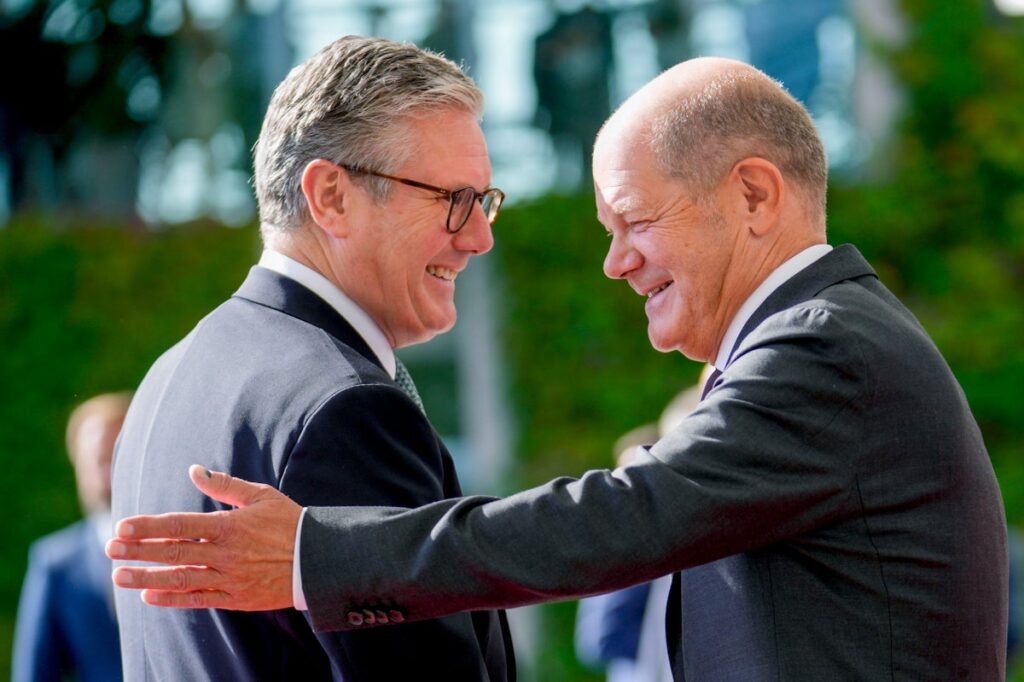Keir Starmer has pledged to “achieve a turning point with Brexit” and to restore relations with EU member states while he visits Germany and meets Chancellor Olaf Scholz today.
Upon arrival in Berlin, the prime minister says he wants to repair the “broken relations” created by previous governments and conclude new agreements with European neighbours.
The Prime Minister will add: “We have a unique opportunity to reset our relationship with Europe.”
No details have been released about the deal British negotiators want to strike with German officials, but Number 10 says the trip marks the start of negotiations expected to last the next six months.
They add that it will cover “vital areas for greater cooperation”, including better market access, clean energy and defence. It will sit alongside the UK’s long-standing treaties with France.
Sir Keir’s approach is a departure from the previous government, which was less open to the prospect of closer cooperation with the EU.
The new prime minister has said he respects the results of the 2016 Brexit referendum, but has focused on keeping the UK in the European Union. He also served as shadow Brexit minister under former Labour leader Jeremy Corbyn from 2016 to 2020.
Here are some of the options Sir Keir is considering as he heads to Berlin:
Defense Agreement
No. 10 says the UK-Germany talks build on a defence deal already under negotiation. In July, the two countries issued a joint statement committing to “enhanced bilateral defence cooperation” in light of Russia’s invasion of Ukraine.
The talks starting in Berlin are likely to confirm these promises, with negotiations beginning on a bilateral treaty modelled on the UK’s deal with France, the 50-year-old Lancaster House Treaties, ratified in 2010 by then-Prime Minister David Cameron.
As part of the trip, Sir Keir will also meet Armin Theodor Papperger, the CEO of Germany’s largest defence and security company, Rheinmetall. The company has several defence contracts with the UK, with work described by No 10 as “vital to the modernisation of the British armed forces”.
Deal on border security
Sir Keir also wants “joint action” on illegal migration during his visit to Germany. No 10 specifies that this will include further intelligence sharing to intercept and shut down organised immigration crime rings.
Tackling illegal immigration was one of the Prime Minister’s key promises before the general election, with a key focus on tackling criminal gangs that exacerbate the problem.
He is likely to find an ally in Mr Scholz, who last week reaffirmed his position that irregular migration to Germany “must come down” after three people were killed in an attack by an asylum seeker in the city of Solingen last week. Sir Keir says he will also use his trip to offer condolences to the German people.
Priority for British companies
The prime minister is also reportedly seeking preferential access for British companies to the German market during his visit to the country. This would include tackling trade barriers such as certifications, tender information and German laws, a source said. The Times.
Sir Keir will say in Germany that he believes “boosting economic growth” in both Europe and the UK is a vital mission, with “market access” also mentioned as a topic of discussion. No 10 points out that Germany is the UK’s second-largest trading partner, accounting for 8.5 per cent of all British trade.
Youth Mobility Program
As the Prime Minister looks to improve UK-EU relations, there is speculation that the foundations could be laid for a scheme that would allow young people to live and work in EU countries.
However, ministers have ruled out the possibility. Sir Keir joined then-Prime Minister Rishi Sunak in April to reject a formal offer from the EU to negotiate a bloc-wide mobility plan, with government sources reiterating his opposition in August.
“We are not considering it, there are no plans for it, or any work being done on it,” a government spokesman said. “Our negotiating team has very clear red lines, and none of the preparatory work has taken this into account.”
It is thought this could lead to disagreements during negotiations in Berlin, as German officials are said to be seeking to force the UK to strike such a deal in return for lucrative new trade deals.

